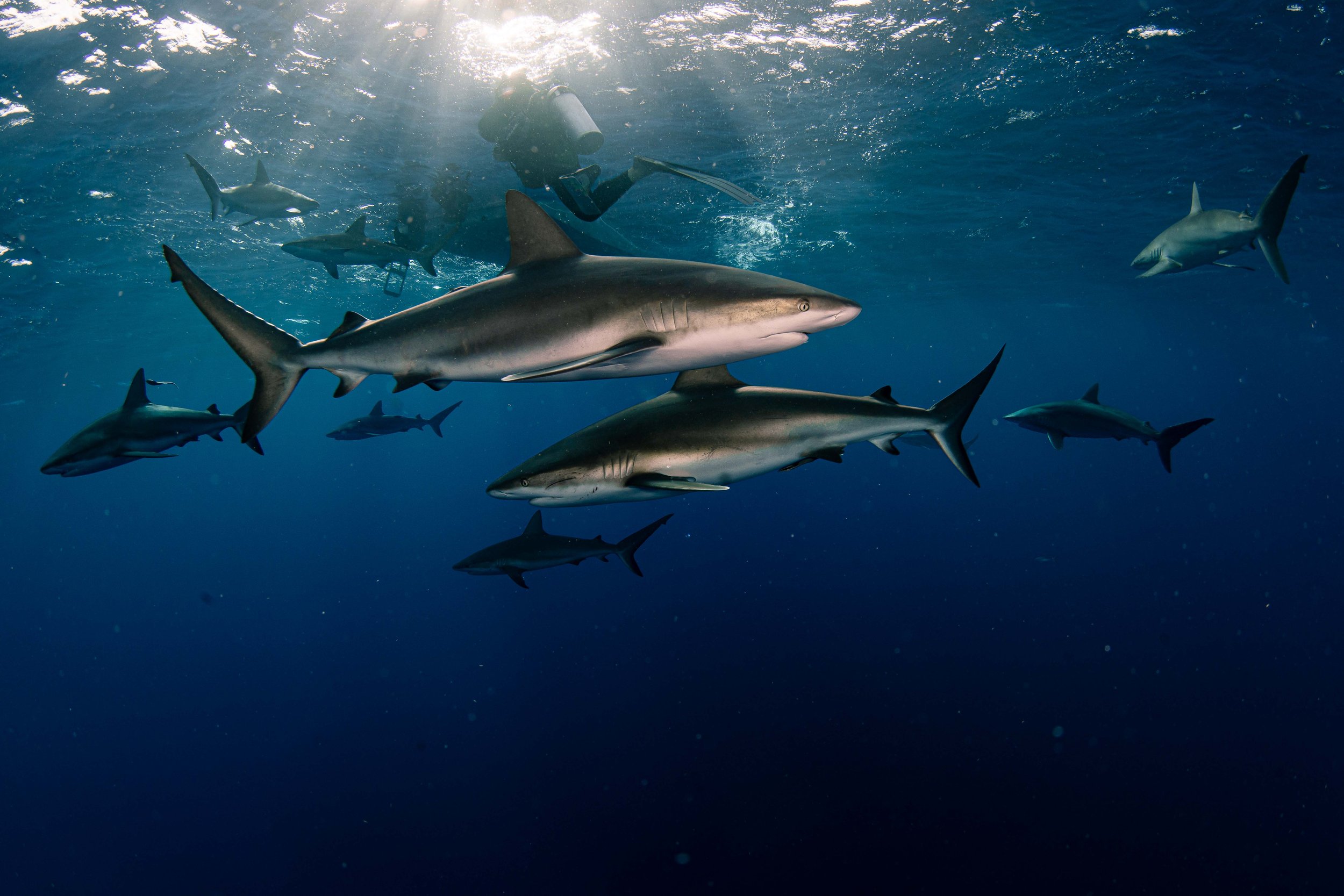Is Scuba Diving Actually Scary? Here’s How To Get Over Your Fear
Scuba diving opens up a whole new world beneath the waves but for many, the thought of taking the plunge can be intimidating. It’s normal to feel scared, breathing whilst submerged in deep water is pretty unnatural after all, but with the right training and mindset you can transform that apprehension into excitement.
Overcoming fear is a journey, and scuba diving is no exception. By understanding what to expect and taking small steps, you'll be ready to dive in and enjoy the underwater experience. The key is to embrace the adventure with an open heart and a clear mind.
Having a blast underwater! Scuba diving is so much fun when you take the effort to learn the skills and follow safety guidelines.
Before You Start
Before you start trying underwater photography, you must have mastered your diving skills first. Good buoyancy control is crucial as it ensures you can navigate the waters safely and responsibly. Remember that you’ll probably be diving in fragile marine environments like corals, and you don’t want to damage them with your inexperience.
Even if you’re only using a small action camera, proper buoyancy is key to protecting both the ecosystem and the safety of yourself and other divers.
Before taking your camera underwater, you should first master using it above water. It’s much harder to adjust the settings and handle a camera while underwater, and if you’re not familiar with the controls, then you could miss capturing key moments.
If you can become comfortable with your camera on land, then you’ll be more prepared to make quick adjustments and get the perfect shot.
Understanding Your Fears
Scuba diving is an experience like no other, but it’s natural to have some anxieties about it. Understanding your fear and what’s causing it will help you to address it before your dive.
Why Scuba Diving Causes Fear
A fear of scuba diving is, in most cases, actually a fear of something else. Most commonly, people are afraid of being in deep water, being submerged in water, or encountering things during the dive. The vastness and mystery of the ocean might trigger anxiety about what lies beneath, but once you start to learn the facts you’ll quickly learn that the ocean is a lot less scary than it seems.
Other people may have more specific phobias, such as equipment failure or jumping off of the boat. The feeling of being dependent on equipment or other people is naturally intimidating. Though daunting, learning how to trust your gear and dive instructors will come with practice and experience over time.
Take some time to understand the rational and irrational fears that you have associated with scuba diving to help you build a foundation to tackle them head-on.
Common Fears: Sharks and Enclosed Spaces
Surprisingly, one of the biggest fears surrounding scuba diving is encountering sharks. This is probably due to media portrayals of the underwater world, which definitely exaggerate the risks involved.
The reality is that you’re pretty unlikely to encounter a shark unless you actually go looking for them. And if you do come across a shark in the water, you should consider yourself very lucky! Most sharks do not prey on humans and in the rare instances where shark attacks do happen, they are usually caused by the shark misidentifying the person as food due to poor visibility for example.
Diving with sharks is a breathtaking experience that requires skill, experience, and strictly following safety guidelines.
Understanding that sharks are not out to hurt us and instead appreciating them for the amazing creatures that they are will help you to be more confident in your next scuba dive. You might even build up the courage to purposefully scuba dive with sharks!
Another common fear whilst scuba diving is claustrophobia caused by wearing tight gear like masks and wetsuits. In this case, the best way to lessen your fear is to simply get used to wearing and using your kit. Practicing key scuba diving techniques whilst you’re in a pool, like underwater breathing and mask clearing, will help you to gain confidence when you’re on your next dive.
Claustrophobia can also be caused by diving in tight spaces, like during wreck diving or cave diving. You can naturally avoid this by choosing to dive in open sites with good visibility. PADI also offers courses specific to different diving experiences such as wreck and cave diving, which can also help you to feel more confident.
Techniques for Overcoming Scuba Diving Anxiety
During a dive, managing your anxiety is crucial. Deep breathing exercises before heading into the water are fundamental for calming yourself down and getting into the right headspace. Practice inhaling slowly through your nose, holding your breath for a few seconds, and then slowly exhaling through your mouth to control your heart rate and calm your nerves.
If you’re prone to anxiety, you can also try visualization exercises to help prepare for your dive. In the days leading up to your experience, mentally picture yourself diving with confidence. Imagine yourself descending, exploring the ocean and finding an array of marine life, and feeling relaxed as you do so.
Repeatedly experiencing this mental imagery will help to build positive reinforcement connections in your mind, and will make the real dive less intimidating.
Combining these exercises, along with any of your personal ways to destress and relax, will help you to create a calm underwater experience. Over time, you can build a pre-dive routine that will get you into the right headspace for scuba diving and allow you to enjoy your dive without fear.
Essential Scuba Diving Skills and Preparation
Being prepared for your scuba diving experience and getting some solid dives under your belt will naturally help you to gain confidence.
Learning Key Scuba Skills with PADI
Any reputable scuba diving company will not allow you to scuba dive without having taken part in a Discover Scuba Diving (DSD) course at the very least, though most will require that you complete the first level of scuba certification, such as the PADI Open Water Diver course.
The goal of this course is to provide a solid foundation for the essential scuba diving skills that are required to keep you safe.
In a swimming pool, you’ll learn how to breathe underwater, maintain proper buoyancy and navigate safely, and you’ll complete online training to learn scuba terminology and other essential knowledge.
PADI offers numerous courses for scuba divers of all levels, and they also offer refresher courses which allow you to practice your skills in a safe and controlled environment.
My wife posing with a sleepy green turtle. Adequate buoyancy skill is essential to safely observe marine life, let alone photograph it.
Building Confidence Through Exposure Therapy
Really, the best way to gain confidence with scuba diving is through experience. Exposure therapy is a strategy where you gradually introduce yourself to different diving scenarios to help you manage your fear in a step-by-step way.
The idea is that you start small and build up to more challenging experiences, creating a fear ladder to map your progress.
For some of you, just the thought of being in deep water will be daunting. In this case, the initial steps to building confidence could be as small as immersing your face in water at home to get used to the sensation, or treading water in a deep swimming pool to help manage your breathing.
By gradually increasing your exposure in controlled settings, you will acclimate to the underwater world and reduce your fear over time. There’s no ‘one size fits all’ method to this - simply start where you feel confident and build from there.
Diving with Support and Positivity
When scuba diving, having the right support and mindset can transform your experience. It's essential to surround yourself with people and thoughts that boost your confidence and enjoyment.
Having a Supportive Dive Buddy
Having a supportive dive buddy can make or break your diving experience. By choosing someone who understands your concerns and is there to guide you, you'll feel more at ease.
A dive buddy, especially an experienced one, will help you to build your confidence underwater and naturally push you out of your comfort zone, likely without you even realising it!
You should always discuss your diving plan with your buddy before diving, as well as any hesitations that you have. Having this communication can alleviate your anxiety and ensure that both of you are on the same page. Make sure that you choose a buddy who is patient, attentive, and genuinely willing to support your dive journey.
Diving is always better with a buddy! Having my wife by my side not only makes it safer but also lets us share these amazing underwater adventures together.
Keeping a Positive Mindset Underwater
Going into a dive, you should try to keep a positive mindset. Though this will be easier said than done, staying positive will help you to rewire the association with fear and instead associate scuba diving with being a fun and rewarding experience.
Before the dive, you can try different relaxation techniques such as meditation and visualisation to help you build confidence.
If you start a dive thinking that everything is going to go wrong, you will already be in a position to panic. Instead, picture yourself successfully completing the dive and enjoying the underwater sights you’ll encounter.
Try setting small, achievable goals for each dive to slowly build your confidence, and celebrate each success to reinforce the positive feelings. The diving community is a great one and the majority of other divers you meet will encourage you to try new experiences in a supportive environment.
They’ll also be there to celebrate successful dives with you, so don’t be afraid to get to know the other people on your diving trip.




